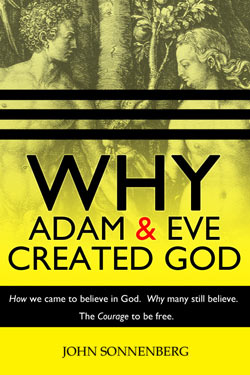I am a big believer in freedom and liberty, and particularily religious freedom. Religious Freedom is a fundamental human right and everyone should have the right to believe – or not.
Growing up a Christian and living in America, I understand how important a person’s faith is to them. Faith in God is vital to so many people we all must defend religio0us freedom. But when I say religious freedom, I mean freedom in the truest sense of the phrase. People must be free to choose their religion and their God as well as free to choose no religion and no God. Religious freedom is what this site is all about. Providing people with the information they need to free themselves.
The Price of Freedom
Freedom comes at a price. Freedom is not free, and every freedom is paid for by some price. Society pays a price for religious freedom, by allowing anyone who so wishes to maintain a warped sense of reality brought on by blind faith and ancient superstitions. When the conversation changes to talk of spirits, ghosts, demons, and superstitions – we politely smile. We put up with people praying for results instead of going out and getting them. Its a price we can afford to pay.
To choose to believe in a religion is OK in most cases, and even when we feelsomething must done about a religious zealot, we should tread lightly. But there are times when the price of religious freedom is too high. We let religions get away with crimes and atrocities that should not be tolerated. Laws and public policy should be free of religious bias, but time and again we see the faithful protecting faiths that they don’t even agree with. News about some religious leaders perpetrating sex crimes and hiding corrupt financial misconduct are a routine component of the daily news. Raped little boys and girls and finances of elderly people should not have to pay for religious freedom.
Here is a list of some web sites that document the high price some paid for religious freedom:
http://religion_crimes.tripod.com/ Crimes committed in the name of God and religion.
http://www.humanreligions.info/ The association between religion and violence.
http://www.vaticancrimes.us/ Videos and Articles about Catholic misbehavior
http://stopbaptistpredators.org/index.htm
http://bishopaccountability.org/
The Rewards of Religious Freedom
When you finally take the step away from religion, you are rewarded with an exhilarated feeling of relief. Many religions convince their followers that only believers in God are happy. After hearing this for years, they believe it. Its quite the enlightening experience to find out that a person is much happier without religion. The faithful think that knowing heaven awaits them will make up for years of mental anguish. They are trained to turn off reason and listen with blind faith. Over and over they are told they are happy. And they usually believe it. But once a person takes that step away from religion, so many new and truly rewarding experiences make life much more enjoyable. For example:
No Hell. Unbelievers do no think that most people are going to hell. We can look at innocent children with parents of various faiths and smile at them instead of pity them because they’re going to burn in hell.
Self Determination. Being in control of your life is very rewarding. Assuming God will jump in and re-direct it at any moment creates an anxiety and depression.
Pride. When a person succeeds, it feels great. Giving all credit to some God, saint, or angel unfairly diminishes the feeling.
Compassion. When bad things happen to others, we can rise up and help for all the right reasons. Assuming God is punishing someone by harming them makes helpful action unlikely.
Clear Mind. Understanding how the world really works is amazing. The superstitions, unreasonable thinking, and bad science required to believe in God is brain numbing.
More Time. Having Sunday mornings available for fishing is nice. The hundreds of hours a nun drills bible verses into children can never be recovered.
More Money. The extra money we make because we are self-determined, proud, compassionate, and clear thinking can be used for family, charity, or having fun. Poor widows and unsuspecting believers who fork over as much money as they can to allow some evangelist to buy a new jet is a shame.
Mercy. Millions of African lives are saved because good people fight Aids. Its unlikely a believer will go against what he thinks is Gods will, and help solve the Aids/HIV crisis.
Rationality. By knowing our limitations, what is possible, probably, likely and unlikely, we embrace the moment and live. Those who turn over their destiny over to fate, God, or a horoscope are missing out on the adventure ride of life.
